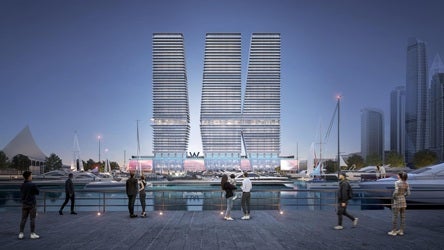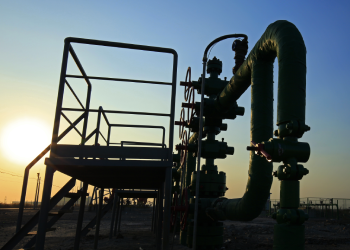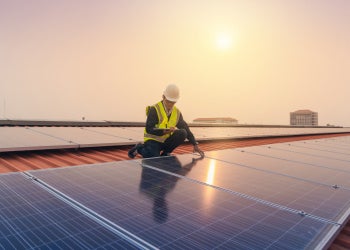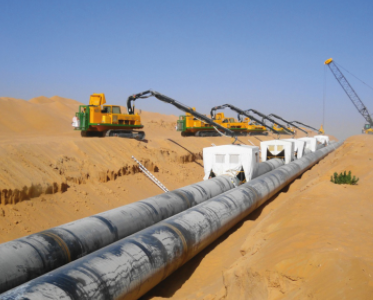Trump’s foreign policy shakes global relations
26 February 2025
 Commentary
Commentary
Edmund O’Sullivan
Former editor of MEED
Doubts about US President Donald Trump’s foreign policy have been largely dispelled by actions in February 2025 that have remade the foundations of America’s approach to world affairs.
Trump had a telephone conversation with Russian President Vladimir Putin and dispatched envoys to Riyadh for meetings about ending the three-year conflict in Ukraine. Tariffs were imposed on imports from Canada, China and Mexico and others announced for March on steel and aluminium. Automobiles, semiconductors and pharmaceuticals are to be targeted in April. Huge cuts in foreign aid have been ordered.
And exceeding even the worst fears, Trump declared that the US will take over Gaza and encourage its people to leave for neighbouring nations when the war there ends.
Everyone is bemused and many are offended. Among the nations most outraged are those that had seen themselves as America’s best friends, including Egypt, Jordan and Saudi Arabia.
Trump has upturned diplomatic conventions by being almost as tough on America’s allies as China, now identified as Washington’s principal long-term foe.
There is an exception. Israeli Prime Minister Benjamin Netanyahu was the first foreign leader Trump greeted at the White House [pictured]. He enthusiastically welcomed the impossible Gaza plan.
Saudi Arabia has denounced the project and restated its commitment to a two-state solution. Hopes engendered mainly by Washington think tanks that Riyadh was poised to normalise relations with Tel Aviv have been exposed as fanciful. The kingdom in February reaffirmed its traditional position as leader of the Arab and Islamic world.
But at least the first six-week phase of the Gaza ceasefire was largely respected. The longer it lasts, the harder it will be to break.
This has given Trump’s administration time to focus on ending the Ukraine war. The negotiations between Moscow and the US in Riyadh is a sign of where power may reside in the next four years, and an indication that it will not be in Europe.
Lasting impact
It is just over 80 years since US President Franklin D Roosevelt met Soviet leader Joseph Stalin in Crimea in a seminal summit that defined the parameters for imperfect but lasting peace in Europe. Some say the meetings in Riyadh may be the Yalta conference of our times.
The parallel is probably wrong. But the structure of international relations has been altered in ways that are profound and lasting. That is why the events of February 2025 – as they did in the same month in 1945 – will resonate through our lifetimes and beyond.
Connect with Edmund O’Sullivan on X
More from Edmund O’Sullivan:
> Between the extremes as spring approaches
> A leap into the unknown
> Middle East faces a reckoning
> Biden leaves a mixed legacy
> Desperate days drag on
> The beginning of the end
> The death of political risk
> Italy at centre of new reduced Europe
> US foreign policy approach remains adrift
> Rainmaking in the world economy

Exclusive from Meed
-
 Arada awards $408m W Residences Dubai Harbour contract
Arada awards $408m W Residences Dubai Harbour contract23 February 2026
-
 Seven companies show interest in $3.3bn Kuwait gas project
Seven companies show interest in $3.3bn Kuwait gas project23 February 2026
-
 Egypt tenders 500MW solar IPP
Egypt tenders 500MW solar IPP19 February 2026
-
 Local contractor wins $143m Jeddah sewage contracts
Local contractor wins $143m Jeddah sewage contracts19 February 2026
-
 Saudi Arabia prequalifies firms for gas transmission grids
Saudi Arabia prequalifies firms for gas transmission grids19 February 2026
All of this is only 1% of what MEED.com has to offer
Subscribe now and unlock all the 153,671 articles on MEED.com
- All the latest news, data, and market intelligence across MENA at your fingerprints
- First-hand updates and inside information on projects, clients and competitors that matter to you
- 20 years' archive of information, data, and news for you to access at your convenience
- Strategize to succeed and minimise risks with timely analysis of current and future market trends

Related Articles
-
 Arada awards $408m W Residences Dubai Harbour contract
Arada awards $408m W Residences Dubai Harbour contract23 February 2026
Register for MEED’s 14-day trial access
Sharjah-based real estate developer Arada has awarded a AED1.5bn ($408m) contract for the main construction works on its W Residences project at Dubai Harbour.
The contract was awarded to the local Engineering Contracting Company.
The development comprises 490 branded residences across three towers.
The project's enabling works, including excavation and piling, have begun and are being carried out by another local firm, APCC Piling & Marine Contracting.
Arada has awarded APCC a separate AED51m ($14m) contract to undertake the enabling works.
The development will consist of residential, retail and leisure facilities and will be operated by US-based Marriott International.
Arada launched the project in October 2024, as MEED reported.
The latest contract award follows Arada's award of two contracts, worth AED2.7bn ($735m), for construction work on all four phases of the Masaar 2 residential community in the Rowdat district of Sharjah.
Arada awarded Sharjah-based Intermass Contracting a contract for the construction of phases one, three and four.
Abu Dhabi-based contractor Pivot Engineering & General Contracting won a contract to build the second phase of the project.
The overall scheme encompasses the construction of 1,997 residential units across all four phases.
Construction is expected to begin shortly, and the project is slated for completion by 2028.
Arada is the developer behind three masterplanned residential communities in Sharjah. The Aljada, Masaar and Nasma Residences communities are valued at a combined AED33bn.
https://image.digitalinsightresearch.in/uploads/NewsArticle/15717440/main.jpg -
 Seven companies show interest in $3.3bn Kuwait gas project
Seven companies show interest in $3.3bn Kuwait gas project23 February 2026

At least seven companies have shown interest in participating in the planned tender for a Kuwait Gulf Oil Company (KGOC) project to develop an onshore gas plant, according to industry sources.
The project budget is estimated to be $3.3bn and the last meeting with contractors to discuss the project took place in Kuwait on 10 February.
Previous meetings with contractors took place at the offices of Technip Energies in Abu Dhabi.
Contractors that have sent representatives to the meetings include:
- Samsung E&A (South Korea)
- Larsen & Toubro (India)
- Tecnicas Reunidas (Spain)
- Saipem (Italy)
- Hyundai Engineering & Construction (South Korea)
- Hyundai Engineering Company (South Korea)
- JGC (Japan)
At the last meeting, contractors were told that the invitation to bid is currently scheduled to be issued at the end of March.
It was also confirmed that Kuwait’s Central Agency for Public Tenders (Capt) will not be involved in the tender process.
Capt is supposed to review technical and commercial evaluations of bids and verify that bidding is competitive.
It is understood that not requiring Capt to approve this tender will speed up the tender process.
The plant will have the capacity to process up to 632 million cubic feet a day of gas and 88.9 million barrels a day of condensates from the Dorra offshore field, located in Gulf waters in the Saudi-Kuwait Neutral Zone.
In July last year, MEED reported that KGOC had initiated the project by launching an early engagement process with contractors for the main engineering, procurement and construction tender.
France-based Technip Energies completed the contract for the front-end engineering and design.
The facility will be developed next to Kuwait’s Al-Zour refinery.
https://image.digitalinsightresearch.in/uploads/NewsArticle/15717358/main.png -
 Egypt tenders 500MW solar IPP
Egypt tenders 500MW solar IPP19 February 2026
Register for MEED’s 14-day trial access
Egyptian Electricity Transmission Company (EETC) has issued a request for qualifications for a 500MW solar photovoltaic (PV) independent power producer project in Egypt’s West of Nile area.
The bid submission deadline is 11 May.
The project is being supported by the European Bank for Reconstruction & Development and will be developed under a build-own-operate model.
Developers will be responsible for designing, financing, constructing, owning and operating the plant, with EETC acting as the offtaker for generated electricity.
US/India-based Synergy Consulting is acting as lead, financial and commercial advisor for this transaction.
The project forms part of Egypt’s strategy to strengthen long-term electricity supply and increase renewable generation capacity.
Egypt is targeting 42% renewable energy in its power mix by 2030. The country aims to raise this share to 65% by 2040.
EETC previously had plans to build a 200MW solar plant in a west Nile area but cancelled the tender for the project in 2020.
Egypt's power sector had its strongest year in over a decade last year, accounting for $4.2bn of total contract awards.
Despite dipping from the previous year, solar accounted for about $1bn of total awards.
In November, a consortium of local firms Hassan Allam Utilities and Infinity Power won contracts to develop two solar PV projects with a combined capacity of 1,200MW, supported by 720 megawatt-hours (MWh) of battery storage.
The UAE’s Amea Power and Japan’s Kyuden International Corporation also recently reached financial close on a $700m project comprising a 1,000MW solar plant and 600MWh battery system in Aswan.
The scheme is backed by a $570m debt package led by the International Finance Corporation and is expected to become Africa’s largest single-asset solar and storage facility when it enters operation later this year.
https://image.digitalinsightresearch.in/uploads/NewsArticle/15701778/main.jpg -
 Local contractor wins $143m Jeddah sewage contracts
Local contractor wins $143m Jeddah sewage contracts19 February 2026
Register for MEED’s 14-day trial access
Saudi Arabia’s National Water Company (NWC) has awarded two sewage network contracts worth a combined SR536.3m ($143m) to local contractor Civil Works Company.
The projects will be implemented over 32 months from site handover and will serve northern Jeddah districts.
The first contract, valued at SR278.5m ($74.3m), covers incomplete main lines and secondary sewage networks serving parts of the Al-Bashair, Al-Asala and Al-Falah neighbourhoods.
The scope includes pipelines ranging from 200mm to 800mm in diameter with a total length of about 54.8 kilometres (km).
The package also includes sewage tunnels with diameters ranging from 600mm to 1,800mm and a total length of approximately 6.5km. Works will also serve the Taybah, Abhar Al-Shamaliyah and Al-Hamdaniyah districts.
The second contract is valued at SR257.8m ($68.8m). It covers the implementation of main lines and sub-networks to serve part of the Al-Hamdaniya neighbourhood.
The works include pipelines ranging from 200mm to 1,500mm in diameter with a total length of about 78.5km. The scope also includes horizontal drilling works for sewage tunnels with diameters from 1,200mm to 1,400mm and a total length of approximately 205 metres.
https://image.digitalinsightresearch.in/uploads/NewsArticle/15699620/main.jpg -
 Saudi Arabia prequalifies firms for gas transmission grids
Saudi Arabia prequalifies firms for gas transmission grids19 February 2026
Register for MEED’s 14-day trial access
Saudi Arabia's Energy Ministry has prequalified companies to develop natural gas distribution networks in five industrial cities in the kingdom on a build-own-operate (BOO) basis.
The industrial zones earmarked are Al-Kharj Industrial City; Sudair City for Industry and Business; and the First, Second and Third Industrial Cities in Jeddah, the Energy Ministry said in a statement.
The contractors prequalified to bid for the natural gas transmission grids BOO scheme include eight standalone firms and seven consortiums:
- East Gas (Egypt)
- Natural Gas Distribution Company (Saudi Arabia)
- Egyptian Kuwaiti Advanced Operation and Maintenance (Saudi Arabia)
- Modern Gas (Egypt)
- Saab Energy Solutions (Saudi Arabia)
- Sergas Contracting (Saudi Arabia)
- Bharat Petroleum Corporation (India)
- UniGas Arabia (Saudi Arabia)
- Best Gas Carrier / Khazeen / Mubadra (Saudi Arabia)
- Al Sharif Contracting (Saudi Arabia) / Anton Oilfield Services Group (China) China Oil and Gas Group
- Hulul (owned by Saudi Arabia’s National Gas and Industrialization Company) /Al-Fanar Gas Group (UAE)
- Indraprastha Gas (India) / Masah Contracting (Saudi Arabia)
- Expertise Contracting / PGL Pipelines (UK)
- National Gas Company (Egypt) / Egypt Gas (Egypt)
- Taqa Arabia (Egypt) / Taqa Group (UAE)
The Energy Ministry has set a deadline of 23 April for these prequalified contractors to submit technical bids.
The ministry added in its statement that it has identified a total of 36 industrial cities in Saudi Arabia for gas infrastructure development.
https://image.digitalinsightresearch.in/uploads/NewsArticle/15699582/main0334.png


